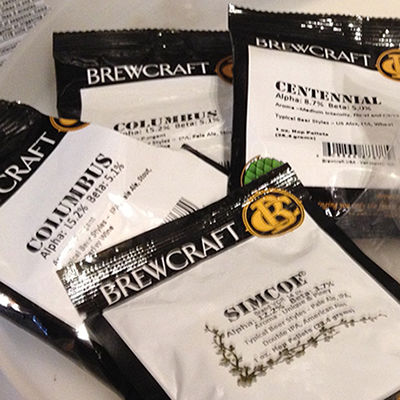
When I read that Russian River brewmaster had shared his recipe for Pliny the Elder, I had to try! Pliny is consistently a top rated beer (currently #7 overall at BeerAdvocate). Picked up the recipe from Brewing Classic Styles, a must for home brewers.

It becomes readily apparent that this is a robust brew considering that it cost me nearly $90 in ingredients (and yes, I know I could have save money had I ordered stuff online).
$25 in malted grainsTo give a sense of how many more hops this recipe calls for, a typical non-hoppy 5-gallon batch of beer would likely call for 2 ounces of hops. This one uses 16 ounces.
$10 in yeast
$55 in hops
As far as home brewing for economic reasons, this one still makes sense since the typical imperial IPA costs double other beer. Still pricy though.

6 ounces of hops in the boil for bittering:
2 oz Columbus (15% alpha acids) 90 minThis gives the beer a ridiculous measure of International Bitterness Units: 336 IBU. Alexander Keiths India Pale Ale has a 28 IBU. Lagunitas Maximus Imperial India Pale Ale is 78 IBU. Nelson's Full Nelson Imperial IPA is 90 IBU. I found a few beer with 100+ IBU, but that's all they state: 100+ IBU. Bushwakker Trephination Double IPA 100+ IBU and Alley Kat Dragon Series Green Dragon Double IPA 100+ IBU.
2 oz Chinook (12%) 90 min
1 oz Simcoe (12%) 45 min
1 oz Columbus (15%) 30 min
Then some hops are added at knockout, the moment the boil ends in order to take advantage of the aromatic oils that are released when hops are added. If they are added any earlier, the oils (which add aroma and flavour) are boiled away and only the acids remain (which only bitter as they are boiled - alpha and beta acids play different roles).
2.25 oz Centennial (strong citrus tones)
1.5 oz Simcoe (passion fruit, pine, earthy, and citrus tones)

Fermentation emitted the most amazing aromas and the initial froth seemed cleaner than all my other brews despite a hop bag bursting in the boil and a bunch of grain getting out of the mash tun.
Then, after the initial fermentation is over, more hops are added. This process is called dry hopping. This process continues to compound the aromatic and flavour profile of the ale. The first dry hopping will last 13 days until bottling. The second will be added 5 days before the end.
2.75 oz Columbus (citrusy and slightly woody)
1.5 oz Centennial
1.25 oz Simcoe
0.25 oz Columbus
0.25 oz Centennial
0.25 oz Simcoe

Hopefully the end result will vaguely resemble its Russian River inspiration. All about hops and balance.




No comments:
Post a Comment